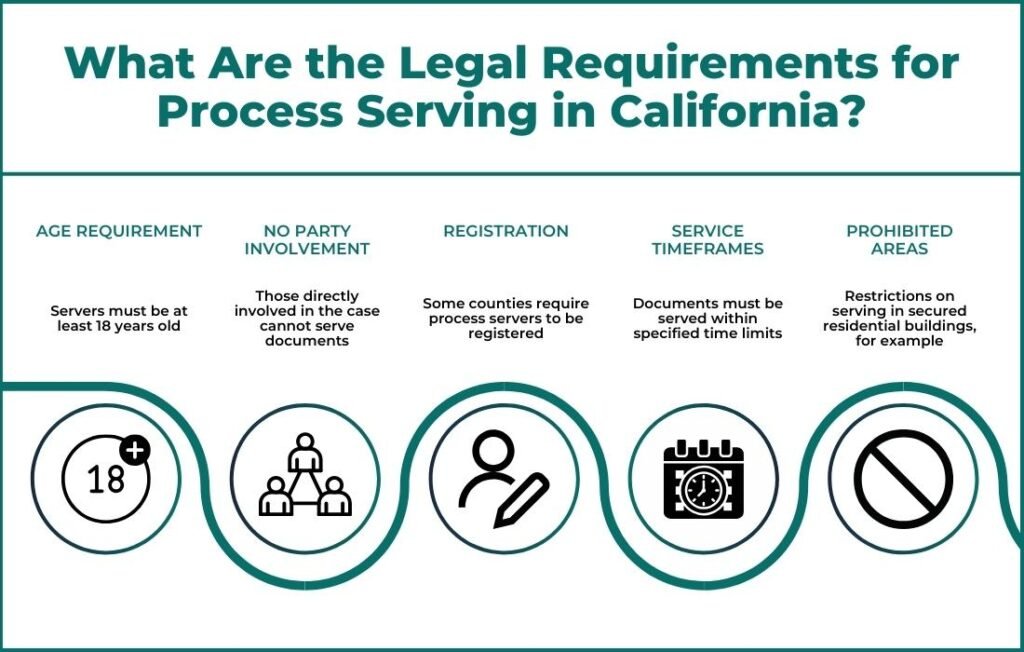Process Serving California
Professional Process Serving Provider in Alameda California
No Gas Surcharges! We’re an eco-friendly company and only use electric vehicles.
In the vast expanse of the Golden State, legal proceedings require meticulous attention to detail, especially when delivering crucial documents.
At Process Serving California, we specialize in the timely, accurate, and professional delivery of legal documents, ensuring that California’s courts and parties are seamlessly connected.
We bridge the gap between legal intent and action, ensuring every document reaches its intended recipient with the utmost integrity.
What is the Role of Process Servers in California?
The role of process servers in California includes
| Role Aspect | Description |
| Legal Document Delivery | Process servers hand-deliver essential court documents to the intended recipients. |
| Affidavit of Service | They provide proof of service after delivery, informing the court of successful completion. |
| Maintaining Neutrality | Ensuring all parties receive fair treatment by remaining impartial. |
| Knowledge of State Laws | Well-versed in California’s specific rules and regulations regarding service of process. |
| Timely Service | Key to ensuring documents are served within the court-stipulated time frame. |
| Safety Protocols | Prioritizing safety in unpredictable situations often encountered during service. |
| Ethical Standards | Upholding the integrity of the legal process by maintaining high ethical standards. |
We Are Open 7 Days A Week
What are the Legal Requirements for Process Serving California?

In California, process servers must adhere to specific legal requirements to ensure the validity of the service. These requirements are set forth to protect the rights of the individuals served. Non-compliance can lead to legal complications and potential dismissal of cases.
- Age Requirement: Process servers must be at least 18 years old.
- No Party Involvement: Individuals directly involved in the case cannot serve the documents.
- Registration: In certain counties, process servers must be registered.
- Service Timeframes: Documents must be served within specified time limits.
- Prohibited Areas: There are restrictions on serving documents in secured residential buildings.
- Proof of Service: An affidavit or proof of service must be filed with the court.
- Continuing Education: Some counties require process servers to undergo periodic training.
How to Become a Certified Process Server in California?

Becoming a certified process server in California involves meeting specific criteria and training. The certification ensures that process servers are competent and knowledgeable about the state’s legal requirements. It also enhances their credibility and professional standing.
| Step | Description |
| 1. | Research Requirements: Check California state-specific requirements and local county regulations. |
| 2. | Complete Training: Enroll in a state-approved training program or course. Typically covers process serving fundamentals and California’s legal procedures. |
| 3. | Pass an Examination: Take and pass a state or county-specific exam after training. |
| 4. | Background Check: Undergo a criminal background check, usually through the Department of Justice. |
| 5. | Obtain a Bond: Secure a $2,000 bond required in California for process servers. |
| 6. | Submit Application: File your application with the county clerk’s office in the county where you wish to operate. |
| 7. | Ongoing Education: Stay updated with laws and procedures. Some counties may require periodic recertification or continuing education. |
What Challenges Are Faced by Process Servers in California?
Process servers in California encounter various challenges that can impede their duties. These challenges range from physical threats to legal obstacles. Overcoming these challenges requires skill, knowledge, and resilience.
| Challenge | Description |
| 1. Evasive Individuals | Some recipients intentionally avoid being served, challenging the delivery of legal documents. |
| 2. Safety Concerns | Process servers may encounter hostile or aggressive individuals during their duties. |
| 3. Complex Regulations | Navigating the intricate state and county-specific regulations can be daunting. |
| 4. High Volume | Due to the large population, there’s a high volume of documents to be served, leading to potential delays. |
| 5. Geographical Barriers | California’s vast size and diverse landscapes can make certain areas hard to reach. |
| 6. Technological Shifts | As more processes move online, there’s a need to adapt and stay updated with digital delivery methods. |
| 7. Legal Liability | Errors in serving or misinterpreting regulations can lead to legal repercussions for the server. |
The Importance of Timely and Accurate Service of Process
Timely and accurate service of process is fundamental to the integrity of the legal system. It ensures that individuals have adequate time to respond to legal actions. Any deviation can compromise the validity of the legal proceedings.
- Upholding Due Process: Proper service guarantees individuals’ constitutional rights.
- Avoiding Case Delays: Timely service prevents unnecessary court delays.
- Legal Validity: Accurate service ensures the enforceability of court orders.
- Avoiding Re-service: Mistakes can lead to the need for repeated service attempts.
- Cost Efficiency: Accurate service reduces the overall cost of legal proceedings.
- Building Trust: Reliability in service fosters trust in the legal system.
- Ensuring Justice: Proper service is foundational to a fair judicial process.
Differences Between California Process Serving and Other States
California’s process of serving laws and regulations differs from those of other states. These differences are shaped by the state’s unique legal landscape and demographics. Understanding these distinctions is crucial for process servers operating in multiple jurisdictions.
| Criteria | California Process Serving | Other States (General Overview) |
| Registration & Licensing | – County-based registration requirements.- Some counties require mandatory registration and licensing. | – Some states have statewide registration, while others have no registration requirements.- Licensing requirements vary widely. |
| Age Requirement | – Must be at least 18 years old. | – Typically, 18 or older, but age requirements vary. |
| Service Methods | – Allows personal, substituted, and sometimes electronic service.- Specific rules for serving on Sundays and holidays. | – Methods vary by state. Some states might not allow substituted or electronic services.- Some states have no restrictions on serving on Sundays or holidays. |
| Bond Requirement | – Process servers are often required to post a bond, the amount of which can vary by county. | – Bond requirements vary. Some states require it, while others don’t. The bond amount can also differ. |
| Training & Education | – Some counties require mandatory training courses and continuing education. | – Training requirements differ. Some states mandate training, while others have no formal education requirements. |
| Service on Business Entities | – Detailed rules for serving corporations, partnerships, and other business entities. | – Rules can vary. Some states might have simpler procedures, while others have more detailed requirements. |
| Electronic Service | – California has specific rules and conditions under which electronic service is permissible. | – Electronic service acceptance varies. Some states have embraced it, while others are more traditional. |
| Proof of Service | – Detailed format for affidavits and proof of service. Must be filed within a specific timeframe. | – Formats and timeframes for filing proof of service can vary. Some states might be more lenient, while others are strict. |
| Fees | – California has its fee schedule for process serving, which can vary by county. | – Fee structures differ widely. Some states have standardized fees, while others leave it to individual counties or municipalities. |
Understanding California’s Rules of Civil Procedure for Service

California’s Rules of Civil Procedure outline the guidelines for serving legal documents. These rules ensure that the service is conducted fairly and transparently. Adherence to these rules is non-negotiable for process servers.
- Types of Service: The rules specify various methods of service.
- Service on Entities: Guidelines for serving corporations and other entities are detailed.
- Substituted Service: Conditions under which substituted service is allowed are outlined.
- Service on Minors: Special provisions exist for serving minors.
- Time Limits: The rules stipulate time frames for serving different documents.
- Proof of Service: The format and requirements for affidavits are provided.
- Service Outside the State: Provisions for serving individuals outside California are included.
Electronic vs. Traditional Process Serving in California
The advent of technology has introduced electronic processes as an alternative to traditional methods in California. While electronic service offers convenience, it also presents unique challenges. Weighing the pros and cons of each method is essential for effective service.
| Criteria | Electronic Service | Traditional Service |
| Method | Digital delivery (e.g., email, online platforms) | Physical delivery (e.g., in-person, mail) |
| Speed | Instantaneous to several hours | Hours to days, depending on the location |
| Cost | Generally lower due to no travel or printing | Higher due to travel, printing, and potential repeat visits |
| Proof of Service | Digital receipt, electronic logs | Affidavit of service, physical signature |
| Acceptance | Accepted for certain case types; parties must agree | Universally accepted; no party agreement needed |
| Security | Requires secure digital platforms; risk of data breaches | Risk of lost or damaged documents; personal safety concerns |
| Regulations | Governed by specific e-service rules in California | Governed by California’s general service of process rules |
Why Choose Us?
With the steadfast dedication of experienced leadership in the field and an unwavering commitment to the environment, Aceso Courier stands out among the rest. That’s because we had a vision and plan for business success, customer service, and a people-focused narrative that matters dearly to us.
Whether it’s ensuring timely deliveries, providing opportunities for service men & women, or ensuring HIPAA-compliant data protection, our services span a diverse range, making us the top choice for all your medial delivery needs.
- Eco-Conscious: Utilizing electric vehicles, Aceso Courier champions environmental responsibility.
- Reliable Deliveries: Offering timely and dependable delivery solutions for businesses and medical facilities.
- HIPAA Compliance: Utilizing secure OnTime360 software, ensuring utmost data protection.
- Diverse Service Range: Catering to a wide spectrum of needs, from medical deliveries to process serving.
Contact our team to schedule process service today in Alameda, Mountain View, Santa Clara, and San Mateo.
Frequently Asked Questions
What is Process Serving California?
It specializes in the professional delivery of legal documents within California.
Are there specific regulations for process servers in California?
Yes, California has state-specific requirements, and some counties have additional regulations.
How long does it typically take to serve a document in California?
Timeframes vary, but most documents are served within 3 to 5 business days.
Temporarily Closed Until Further Notice
Contact Us
If you have questions about our services, routes, or creating an Aceso team for your business, please reach out to us and include as much information as possible. We also suggest calling us directly for quotes and the most detailed service explanations possible. We can’t wait to hear from you.
Pricing
All pricing is done on a customer-to-customer basis, taking many factors into consideration. For single same-day deliveries, you can contact us to arrange your delivery and get a quote.
